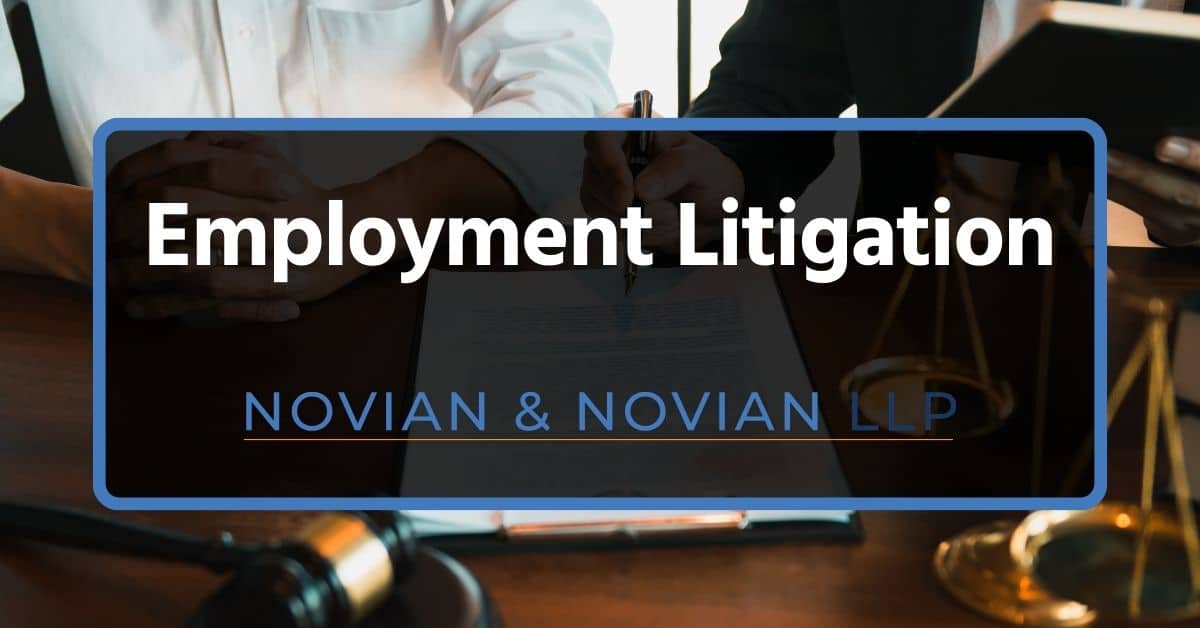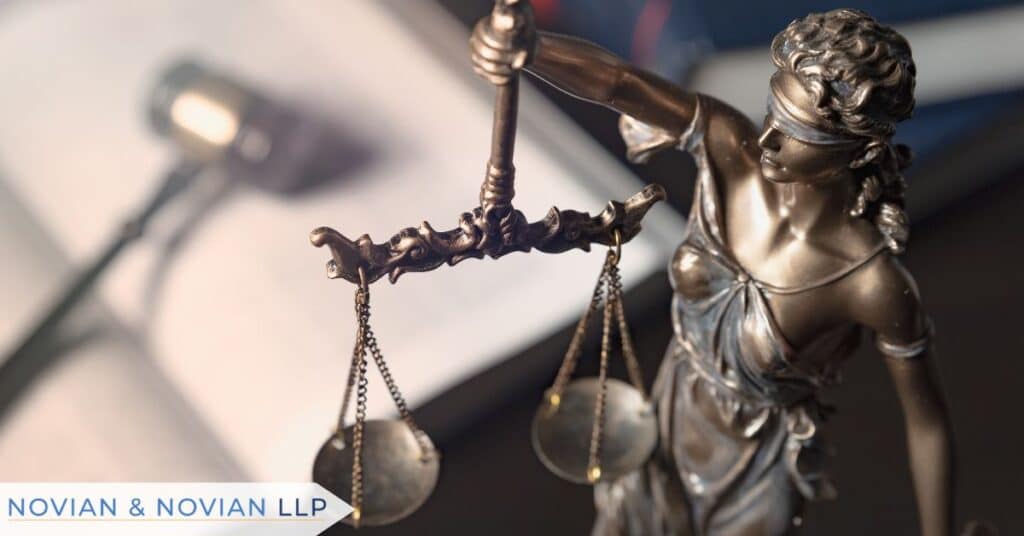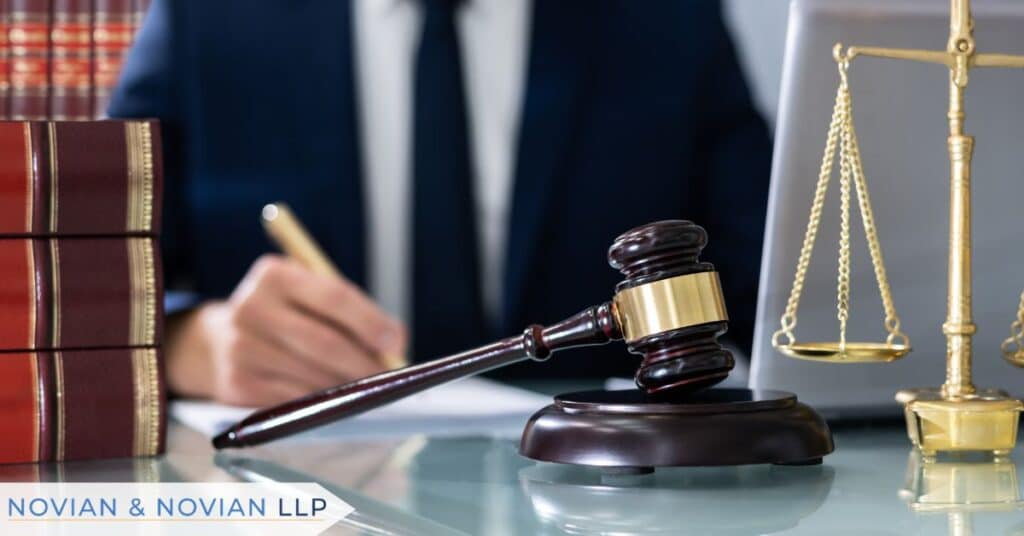
by | Dec 1, 2023 | Employee Issues
In employment litigation, it is important for employers to understand their legal rights, and potential pitfalls, when facing legal action.
Employment law is a challenging area of law in which disputes exist between employees and employers. Most states operate under “at-will” employment laws, granting employers the authority to terminate employees for various reasons. However, these laws are not without limitations, as federal and state regulations prohibit unlawful discrimination based on specific protected characteristics.
At Novian & Novian, we are backed by more than 30 years experience. We are committed to protecting your rights as an employer, and always ready to assist your company with any administrative or judicial claims. We employ businesses minded litigators who take practical approaches to complex issues with the goal of resolving things swiftly and efficiently without burying clients with unnecessary legal fees or having them waste too much of their time. As Los Angeles Employment attorneys, our passion for seeking justice for employers has enabled us to build a strong track record of success for our clients.
This article provides an in-depth overview of employment litigation, focusing on the legal disputes between employers and employees in California, covering aspects such as wrongful termination, discrimination, harassment, and wage disputes, and highlights the services of Novian & Novian, LLP in representing employers in these matters.
What is Employment Litigation?
Employment litigation refers to the legal disputes between employers and employees, typically involving issues related to the workplace. This encompasses a broad range of conflicts, such as wrongful termination, discrimination, harassment, workplace discrimination whistleblower, workers compensation, occupational safety, etc.
Most Common Employment Litigation Cases
1. Discrimination
Legal actions related to unfair treatment based on protected characteristics such as race, gender, age, military service, or disability. This can be in the form of lawsuits alleging discriminatory hiring, promotion, or termination practices. This also extends to job applicants.
2. Harassment
Harassment involves claims related to a hostile work environment or unwanted behavior based on protected characteristics. Some examples include sexual harassment, racial harassment, or harassment based on other protected attributes.
3. Wage Disputes
Legal conflicts regarding compensation, overtime, or wage and hour violations. This can be unpaid wages, failure to provide overtime pay, or disputes over salary classifications.
An employment case stands apart from other legal disputes due to its specific focus on issues arising within the employer-employee relationship. This can range from a protected characteristic dealing with specialized law, wrongful termination due to workplace dynamics, related medical conditions.
Common Causes of Employment Litigation
Federal law recognizes various protected characteristics, including national origin and genetic information. However, states may provide additional protections such as those related to military status, marital status, political opinion, and religion.
California Wage Violations: Most Common Claims
Discrimination can be based on race, sex, sexual orientation and gender identity, disability, age, etc. Workplace harassment is prohibited under state and federal laws. Harassment can manifest through various actions such as slurs, insults, jokes, mockery, and assaults targeting protected characteristics.
Sexual Harassment: Whether based on a hostile workplace or quid pro quo, sexual harassment affects both men and women. It can extend beyond sexual attraction or sexual orientation. A hostile environment can be created through derogatory comments or belittling behaviors.
Wrongful Termination: Wrongful termination is a prominent type of employment discrimination. A protected class, or covered employees, can bring suit if they believe their dismissal violates certain grounds. This may include employment contract violations, anti-discrimination laws, and public policy.
Retaliation and Whistleblower Cases: Laws protect workers who are whistleblower’s, even if individuals are employed by private employers. As a result, employers cannot retaliate against employees who expose illegal conduct. State and federal laws protect whistleblowers from wrongful termination. This is especially true for the California Labor Code.
A History of Success in Wrongful Termination and Harassment Lawsuits
How Can An Employer Prevail in Wrongful Termination and Harassment Lawsuits?
Successful defenses by employers in such cases might involve demonstrating that the termination was based on legitimate reasons, such as poor performance or violation of company policies, rather than discriminatory or retaliatory motives. Employers may also prevail if they can show that they took appropriate steps to address and prevent harassment in the workplace, such as implementing anti-harassment policies and providing training.
It’s important to approach discussions about legal cases with sensitivity, as they often involve private and confidential information. If you’re looking for specific cases, legal databases, court records, and news sources would be valuable resources. Keep in mind that legal interpretations and outcomes can vary, and the information available might be limited due to privacy concerns.
The Legal Framework Governing Employment Litigation — Investigating Claims of Employer Misconduct
The Fair Labor Standards Act (FLSA)
The FLSA, enacted in 1938, protects workers from termination by setting a regulation for overtime wages and establishing child labor laws. Employees will be compensated 1.5 times the regular rate for overtime employment beyond 40 hours in a week.
Additionally, employers must pay the higher of federal or state minimum wage. The FLSA also mandates recordkeeping, such as unpaid wages, and prohibits wage discrimination based on gender for substantially equal work.
The Civil Rights Act
Title VII, a critical component of the Civil Rights Act, addresses discrimination in the workplace. It prohibits employers from discriminating against employees on the basis of race, color, religion, sex, or national origin.The Equal Employment Opportunity Commission (EEOC) was created to enforce the provisions within the Civil Rights Act.
The Americans with Disabilities Act (ADA)
The Americans with Disabilities Act (ADA) is a landmark federal law in the United States that aims to prohibit discrimination against individuals with disabilities and ensure equability in all aspects of life.
Employment Discrimination: Title I of the ADA prohibits employers with 15 or more employees from discriminating against qualified individuals with disabilities in various aspects of employment. This includes hiring, promotions, job assignments, training, and compensation.
Family and Medical Leave Act (FMLA)
FMLA, enacted in 1993, grants eligible employees the right to take up to 12 weeks of unpaid, job-protected leave annually for reasons like childbirth, family member health issues, or military caregiving. Job protection includes maintaining health benefits, and employers must reinstate employees to the same or equivalent positions.
California Family Rights Act (CFRA)
The California Family Rights Act (CFRA) allows eligible employees to take up to 12 weeks of unpaid, job-protected care for reasons such as health or bonding with a new child.
Can An Employee Be Fired For Taking FMLA Or CFRA Leave?
Anti-discrimination laws mandate employers to provide reasonable accommodations for disabled workers and those practicing their religion. While employers must grant these accommodations, exceptions may apply if accommodating them creates an undue hardship.
The FLSA, The Civil Rights Act, The ADA, and The FMLA establish laws that govern employment relationships. These laws provide guidelines, rights, and protections for employees, while also contributing to shaping the course of employment law.
The Employment Litigation Process: Steps Involved in An Employment Law Case
The process typically begins when the aggrieved party, known as the plaintiff, files a formal written complaint against the defendant (employer) outlining the alleged legal violations. The complaint specifies the facts, legal claims, and remedies sought. The complaint is based on legal grounds, such as violations of employment laws (e.g., discrimination, wrongful termination) and includes a request for relief or compensation.
Step 1: Discovery Process
This stage requires employers and employees to gather relevant information and evidence. Both parties can request documents, interrogatories (written questions), and depositions (oral testimony under oath) from the other to build their case.
Step 2: Mediation and Negotiation
Before proceeding to trial, parties often engage in mediation or negotiation to resolve the dispute without a court judgment. A neutral third party, the mediator, facilitates communication and assists the parties in reaching a voluntary settlement.
Attorneys from both sides may negotiate settlement terms, potentially avoiding the time, cost, and uncertainty of a trial. Settlement agreements outline the terms, including financial compensation, reinstatement, or other remedies.
Step 3: Trial and Verdict
Pre-Trial Proceedings: If mediation fails, the case proceeds to trial. Pre-trial activities involve motions, evidentiary hearings, and jury selection.
Trial Proceedings: The trial involves presenting evidence, witness testimony, and legal arguments to the judge or jury. Each party has the opportunity to make opening statements, present their case, cross-examine witnesses, and make closing arguments.
Verdict: The judge or jury issues a verdict, determining whether the defendant is liable for the alleged violations. If found liable, the court decides on the appropriate remedies or damages.
The Role of Lawyers and Legal Representation
Lawyers usually work on a contingency fee basis due to the extensive responsibilities they take on while guiding their clients through the litigation process. Employment lawyers advise clients on legal rights and strategies, represent clients in negations, mediations, and court proceedings.
These employment lawyers also conduct legal research to build a strong case. This involves preparing legal documents and developing arguments in support of their client’s position.
Trial Representation: During the trial, employment law attorneys present the case to the court or jury, ensuring that legal rules and procedures are followed. They use their legal expertise to present a compelling case and respond to challenges from the opposing party.
Impacts of Employment Litigation for Employers
Employment litigation can pose far-reaching consequences for employers. Some of which include:
Financial: Legal proceedings can result in significant financial costs. Employers want to avoid lengthy and costly litigation, which is why they may offer a settlement agreement.
Litigation may bring financial compensation for damages, lost wages, or benefits if successful.
Reputation: Receiving negative publicity can damage a company’s reputation, which will affect relationships with clients, customers, and the public.
Workplace Environment: Litigation can create a tense and divisive atmosphere among employees, impacting morale and productivity.
Long-term implications for the business and individuals involved: Legal battles may make it hard for corporations to recruit top talent or secure business partnerships.
Preventing Employment Litigation: What Are Some Best Practices for Employers?
Employers can avoid employment litigation by creating clear and fair workplace policies, providing training sessions to employees regarding diversity, inclusion, and compliance with employment laws, promptly investigating complaints, and taking proactive measures to ensure workplace safety.
Navigating Employment Litigation As An Employer: Essential Steps and Strategies
Employment litigation can be stressful to handle as an employer. It is why you need to partner with employment lawyers. Some of the things employment law attorneys would advice you to do include:
Maintaining Comprehensive Documentation
As an employer, it’s crucial to keep meticulous records of all workplace incidents, including dates and the individuals involved. This documentation is vital for establishing a clear timeline and context for any workplace issues that may arise, providing a strong foundation for your defense in any legal proceedings.
Consulting with Employment Defense Attorneys
Engage with a specialized employment defense attorney to understand the legal implications of workplace issues from an employer’s perspective. These attorneys can offer expert guidance on your rights, potential defenses against claims, and the most effective strategies for addressing workplace challenges.
Understanding Employer Rights and Legal Options
Stay informed about the employment laws and regulations that apply to your business. Common areas of concern for employers include defending against claims of wrongful termination, age discrimination, and disability discrimination. Knowing your legal rights and responsibilities is key to making informed decisions and effectively managing workplace issues.
Seek Specialized Legal Representation
Employment law is complex, encompassing state and federal employment laws, administrative agencies, and local regulations. As an employer, it’s crucial to have aggressive legal representation to defend against claims such as age discrimination, sexual harassment, wrongful termination, and disability discrimination.
Partner with Expert Employment Defense Lawyers
Employment defense attorneys, like us at Novian and Novian LLP in Los Angeles, are well-versed in both federal and state laws. Specializing in California law, we offer comprehensive legal services tailored to the needs of employers in various sectors, including the private and public sectors, and federal government.
Contact us for a free consultation to discuss your specific needs and how we can assist you in navigating the complex landscape of California employment law.
Conclusion
Navigating the complex terrain of employment litigation can be draining. As employers, you must remain vigilant and be open to adapting and seeking new and proactive solutions. This helps to foster a healthy work environment.
By following the steps we have mentioned and reaching out to us, you’ll ease off some of the burdens. At Novian & Novian, we have your best interest at heart. Reach out to us now for a proactive and more informed approach to employment litigation.
Contact Us
Have questions about this post? Novian & Novian is a full service law firm in Los Angeles with clients that span the country. Contact us today for a free consultation.
Contact Us
Have questions about this post? Novian & Novian is a full service law firm in Los Angeles with clients that span the country. Contact us today for a free consultation.




